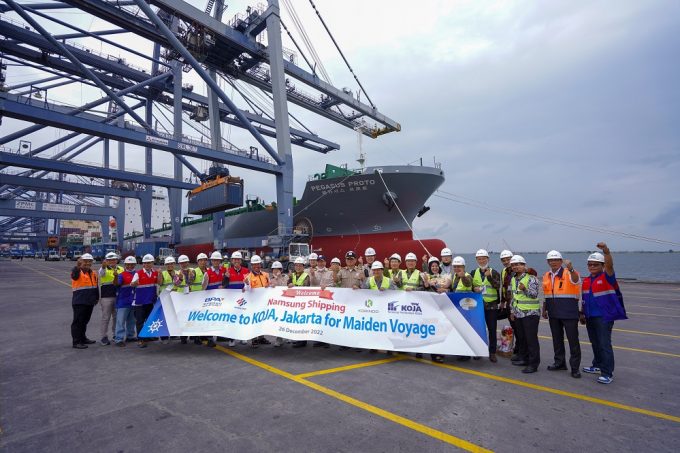Intra-Asia services suffering as smaller box ships are diverted to long-haul trades
The cascading of smaller box ships to more-lucrative long-haul lanes has created a shortage of ...
TFII: SOLID AS USUALMAERSK: WEAKENINGF: FALLING OFF A CLIFFAAPL: 'BOTTLENECK IN MAINLAND CHINA'AAPL: CHINA TRENDSDHL: GROWTH CAPEXR: ANOTHER SOLID DELIVERYMFT: HERE COMES THE FALLDSV: LOOK AT SCHENKER PERFORMANCEUPS: A WAVE OF DOWNGRADES DSV: BARGAIN BINKNX: EARNINGS OUTODFL: RISING AND FALLING AND THEN RISING
TFII: SOLID AS USUALMAERSK: WEAKENINGF: FALLING OFF A CLIFFAAPL: 'BOTTLENECK IN MAINLAND CHINA'AAPL: CHINA TRENDSDHL: GROWTH CAPEXR: ANOTHER SOLID DELIVERYMFT: HERE COMES THE FALLDSV: LOOK AT SCHENKER PERFORMANCEUPS: A WAVE OF DOWNGRADES DSV: BARGAIN BINKNX: EARNINGS OUTODFL: RISING AND FALLING AND THEN RISING

South Korea’s Busan Port is looking to Indonesia’s emerging market to increase its container volumes as more manufacturers shift production from China to South-east Asia.
The port authority has been working with feeder operator Namsung Shipping to launch the Asian New Express, the domestic family-owned firms’s first South Korea-Indonesia service, linking Busan with Tanjung Priok in Jakarta.
Compatriot feeder operators Sinokor and Korea Marine Transport will contribute another three vessels in due course to the service rotation of Busan-Ulsan-Shanghai-Ho Chi Minh City-Laem Chabang-Jakarta-Hong Kong-Shenzhen.
On 26 December, Namsung’s new 1,800 teu Pegasus Proto completed the first round of the service, and Busan Port Authority said it was working with Namsung to launch a service between Busan and Tanjung Perak, in Surabaya, hoping to realise synergies with BPA’s warehouse in Probolinggo Port in East Java.
BPA president Kang Joon-seok said: “We expect South Korean exporters will receive more competitive logistical support through Namsung’s new service, and we will continue to create more shipping routes to Busan.”
While the container freight market has been normalising after two years of unprecedented highs, South Korea-Indonesia freight rates have been steady, at around $1,600 per teu, after doubling over the past two years.
This prompted Sinokor and Namsung to order six 2,500-teu ships at Hyundai Mipo Dockyard last year, intending to deploy them on Indonesian services after delivery this year and next.
Meanwhile, besides the manufacturing shifts, the e-commerce market in South-east Asia has been booming. Annually, Namsung is said to ship 500,000 teu to Busan, making it the third-largest contributor to the port among container lines.
Namsung CEO Kim Yong-kyu said having commenced operations in 1975, initially focusing on services within East Asia, the company had diversified its services beyond Vietnam and Thailand and was now exploring the possibility of providing land transport as it moves towards becoming a “comprehensive logistics provider”.
Comment on this article